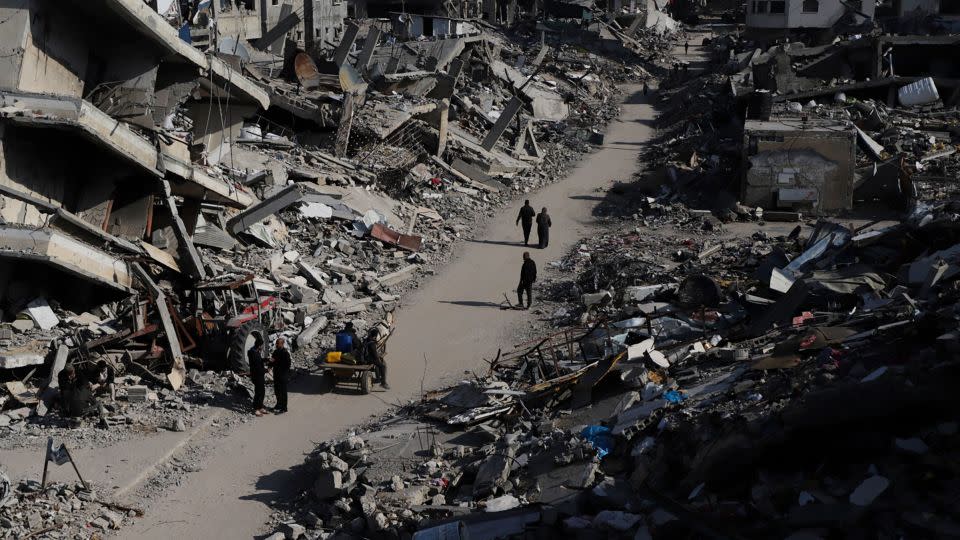Talks on an Israel-Hamas ceasefire deal appear on track after killings at Gaza aid site, officials say

Ongoing talks to reach a ceasefire agreement to halt the fighting between Hamas and Israel in Gaza by Ramadan appear to still be on track, even after more than 100 Palestinians were killed on Thursday as they tried to access food in Gaza City, according to officials familiar with the discussions.
US officials on Friday said there are no indications that the discussions had been significantly derailed but much hinges on an expected Hamas response to what has been discussed in Paris and Doha in the past week between the other countries involved: Qatar, Egypt, Israel and the US. On Thursday, a Hamas official warned the negotiations could be impacted.
CNN has reached out to several Hamas officials about the potential deal but has not gotten a response.
In the immediate aftermath of the deaths of dozens of Palestinian civilians in Gaza on Thursday, US officials said the chaotic scenes injected added urgency into the hostage and ceasefire talks.
On Friday afternoon, President Joe Biden called for an “immediate ceasefire.”
“We’re trying to work out a deal between Israel and Hamas on the hostages being returned and an immediate ceasefire in Gaza for at least the next six weeks and to allow the surge of aid to the Gaza Strip,” Biden said during a meeting with Italian Prime Minister Giorgia Meloni.
A senior administration official said earlier Friday that the US is still racing to try to get a deal across the finish line by Ramadan – now just about a week away – which is when Israel has warned its forces would expand its military operations into Rafah in the absence of a deal.
Biden had said earlier in the week that he hoped there’d be a ceasefire in Gaza by Monday, but he offered a mixed assessment of that possibility later Friday, saying: “It looks like we’re still — it’s not there yet. I think we’ll get there, but it’s not there yet. And it may not get there now.” Asked whether a ceasefire deal may never be reached, he told reporters that he’s “still hoping for it. It’s not over ‘til it’s over.”
The president said Thursday that the deaths at the aid site could make the ceasefire talks more difficult.
Asked if he was worried the deaths would complicate negotiations, Biden responded: “Oh, I know it will.”
Biden spoke on Thursday with the leaders of Qatar and Egypt - countries playing central mediating roles in negotiations.
Technical teams have been working on the key components of a potential deal this week in Doha, officials familiar with the talks say. On Tuesday, Qatari spokesman Majed al-Ansari said disagreements remained over “numbers, ratios and [IDF] troop movements.”
It’s believed that Hamas will demand a higher ratio of Palestinian prisoners to be released by Israel if Hamas is to release female IDF soldier hostages, as demanded by Israel.
CNN Foreign Affairs analyst Barak Ravid reported for Axios on Friday, that as part of a Hamas response Israel expects a list of the hostages who are alive and more details on the number of Palestinian prisoners they want released, before attending more talks.
“We are hopeful that the areas of divergence between the two sides can be bridged and we can reach at least a temporary cessation of hostilities to lead to a permanent [ceasefire],” Egyptian Foreign Minister Sameh Shukri said Friday, while warning that a failure to reach an agreement between Israel and Hamas before Ramadan will aggravate the Arab and Muslim world.
“Everybody has recognized the importance that we are successful in this before the beginning of Ramadan,” he told the Antalya Diplomacy Forum in Turkey.
“If this conflict was to continue into Ramadan, I think it will have a very dire consequence in that emotions will be further inflamed,” he added.
Those involved in the discussions have said an agreement would likely be implemented in multiple phases and once an initial deal is made it could lead to a truce lasting for as long as six weeks with a group of Israeli hostages released – including women, children, the elderly and sick hostages – in exchange for a smaller number of Palestinian prisoners than Hamas had initially demanded.
During a truce, negotiations would take place over more sensitive topics like the release of Israeli soldiers who are hostages, Palestinian prisoners serving longer sentences, the withdrawal of IDF forces and bringing a permanent end to the war alongside the so-called “day after” issues.
This story has been updated with additional details Friday.
CNN’s Kevin Liptak contributed to this report.
For more CNN news and newsletters create an account at CNN.com


